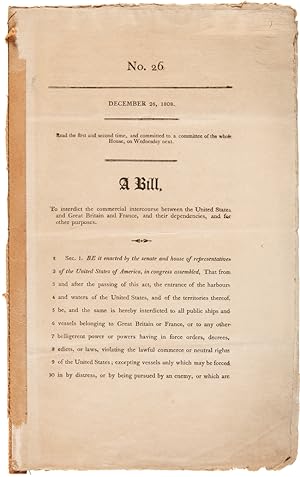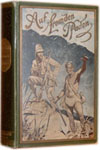No. 26. DECEMBER 26, 1808.A BILL, TO INTERDICT THE COMMERCIAL INTERCOURSE BETWEEN THE UNITED STATES AND GREAT BRITAIN AND FRANCE, AND THEIR DEPENDENCIES, AND FOR OTHER PURPOSES [caption title]
[United States Laws]: [Embargo Act]
Verkäufer
William Reese Company - Americana, New Haven, CT, USA
Verkäuferbewertung 4 von 5 Sternen
![]()
AbeBooks-Verkäufer seit 13. Juli 2006
Beschreibung
Beschreibung:
11pp. Docketed on verso of final leaf. Folio. Dbd., with later paper strip along the spine. Light soiling and wear, horizontal folds. Very good. Untrimmed. A slip-bill printing of the Non-Intercourse Act of 1809, presented to the House of Representatives in December 1808, featuring some significant differences from the final bill. The Non-Intercourse Act of 1809 took a step back from Jefferson's fiercely unpopular Embargo Act of 1807. The Embargo Act came hot on the heels of the Chesapeake-Leopard Affair, and sought to punish Britain and France by shuttering all American trade with foreign nations, both incoming and outgoing. The draconian measure was initially met with approval, but quickly became controversial as the economic effects took their toll. The Massachusetts Legislature recalled Senator John Quincy Adams because he supported the Embargo, and Governor James Sullivan regularly signed bills allowing certain goods to be shipped into Massachusetts ports, in violation of the law. Enforcement of the Embargo relied on the compliance of state governments, which could not always be counted on, particularly in Federalist New England. The Embargo did have the salutary effect of boosting American manufacturing to fill the needs for goods that had been previously imported, but the short-term effects were crippling to American farmers and traders. The Non-Intercourse Act of 1809 amended the embargo to apply only to Britain and France, and provided for its cessation should either nation lift their own wartime strictures. Slip bills are printed in small numbers during the legislative process, for the use of legislators and staff, with the lines of the text widely spaced and numbered for easy annotation and reference during debate. This slip-bill is dated December 26, 1808, and represents the third revision submitted to the House of Representatives. It differs in some notable ways from the final act passed on March 1st: in addition to adding a date of enforcement (left blank on the slip bill), the final act also adds a provision to Section 4 which grants an exception to American vessels already well on their way home as of the end of 1808. More significantly, this draft of the bill is considerably stricter than the final law and makes no reference at all to the repeal of the Embargo Act - in fact, Section 12 reads in part: ".it shall be lawful for the president of the United States, and he is hereby authorized, by proclamation, to prohibit the entrance of the harbours and waters of the United States, and of the territories thereof, to all ships and vessels sailing under the flag of, or owned in whole or in part by any citizen or subject of any other foreign nation, having in force any edicts, laws, orders, or decrees, which violate the lawful commerce and neutral rights of the United States, as generally acknowledged by the law of nations." While the bill made it through two revisions to reach this point, Jefferson and his allies would not be able to get it over the line without considerable concessions - the final bill replaced Section 12 entirely with regulations for granting permits for international trade, and added the all- important provision that "the act laying an embargo on all ships and vessels in the ports and harbors of the United States, and of the several acts supplementary thereto, as forbids the departure of vessels owned by citizens of the United States, and the exportation of domestic and foreign merchandise to any foreign port or place, be, and the same is hereby repealed." A rare slip-bill documenting the legislative process of one of America's most controversial early economic laws, and an important step on the road to war in 1812. Bestandsnummer des Verkäufers WRCAM58729
Bibliografische Details
Titel: No. 26. DECEMBER 26, 1808.A BILL, TO ...
Verlag: [Washington]
Erscheinungsdatum: 1808
AbeBooks ist ein Internet-Marktplatz für neue, gebrauchte, antiquarische und vergriffene Bücher. Bei uns finden Sie Tausende professioneller Buchhändler weltweit und Millionen Bücher. Einkaufen bei AbeBooks ist einfach und zu 100% sicher — Suchen Sie nach Ihrem Buch, erwerben Sie es über unsere sichere Kaufabwicklung und erhalten Sie Ihr Buch direkt vom Händler.
Millionen neuer und gebrauchter Bücher bei tausenden Anbietern
Neue und gebrauchte Bücher
Neue und gebrauchte Exemplare von Neuerscheinungen, Bestsellern und preisgekrönten Büchern. Eine riesige Auswahl an günstigen Büchern.
Antiquarische Bücher
Von seltenen Erstausgaben bis hin zu begehrten signierten Ausgaben ? bei AbeBooks finden Sie eine große Anzahl seltener, wertvoller Bücher und Sammlerstücke.
Versandkostenfreie Bücher
Hier finden Sie viele hunderttausend neue, gebrauchte und antiquarische Bücher, die Ihnen unsere deutschen und internationalen Händler versandkostenfrei liefern.




